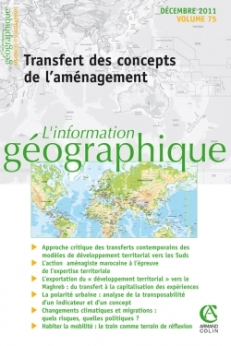
L'information géographique - Vol. 75 (4/2011)
Pour acheter ce numéro, contactez-nous
Recevez les numéros de l'année en cours et accédez à l'intégralité des articles en ligne.
Ce texte s’appuie sur les expériences conjointes de deux expertises territoriales réalisées au Maroc (FSP/Agenda 21) et propose de construire une approche comparée de la circulation des outils et de leur réception auprès des acteurs de l’aménagement du territoire. Les perspectives théoriques visent à mettre en valeur les capacités d’action des territoires, en se penchant sur les liens « de dépendance » dans l’action aménagiste, la diffusion des modèles et outils internationaux inscrits dans le système de gouvernement et de gouvernance propre au Maroc. La formalisation des formes et figures de l’expertise montre un renforcement des modèles existants, une place prépondérante du marché de l’expertise et une émergence encore « fébrile » de formes plus émancipées.
This article discusses two strategic spatial planning options in the framework of current policy changes in Morocco. It examines the dissemination of new planning documents and explains their reception among the actors of regional development by exploring a comparative approach of this “territorial” process. By using such a theoretical framework, the paper grounds its argument on the capacity for action of regions which are linked to the international system of government and governance through a specific relationship of “dependency” that arises from the relationship between the European experts and the national planners in Morocco. The pluralist forms and figures of expertise seem to strengthen traditional models of national planning in Morocco. This case shows a lack of empowerment of the national and local stakeholders facing territorial expertise and their ways of the emergence of news forms of planning negotiations. This discussion is illustrated by a feed-back on two specific expertise experiences led within the Solidarity Priority Fund (under the French DATAR) and through the Agenda 21 dissemination plan led by the United Nations (UN).
